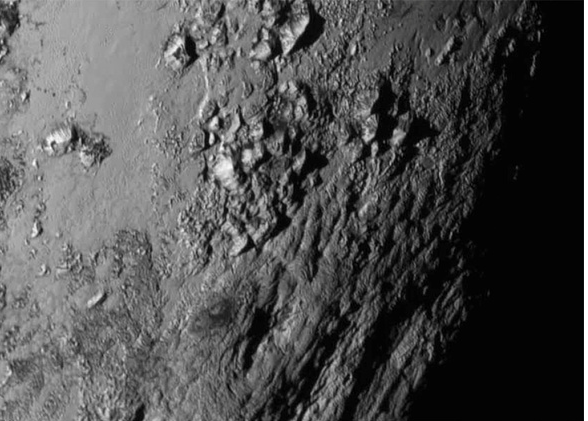By Angel Soleil, | September 25, 2016

Researchers say there may be an ocean hidden in the heart of Pluto.
A new research suggests that there might be an ocean hiding in the heart of the dwarf planet, Pluto. The ocean may be more than 62 miles (100 kilometers) deep and as salty as the Earth's Dead Sea.
A study led by Geologist Brandon Johnson from Brown University focused on Pluto's "heart," a region informally called the "Sputnik Planum." During their observation, they found that the icy surface of the Sputnik Planum sits directly on the tidal axis which links Pluto to its largest moon - Charon.
Like Us on Facebook
Charon and Pluto are tidally locked, so they face each other on the same side. But the Sputnik Planum is found on the side where Pluto constantly faces Charon, creating a position which scientist's describe as "positive mass anomaly." This suggests that on average, the Sputnik Planum produces more mass than the rest of the planet's surface.
Johnson and his team were curious as to how Pluto could have gotten this "positive mass anomaly," so they conducted an asteroid simulation. He and his team raided Pluto's icy surface with several simulations of a 125 miles (200 kilometers) asteroid, which in turn created a huge dent on Pluto. They observed that when the remains of the asteroid's bounced off the surface, Pluto's interior bounced back as well.
During the rebound state, Pluto's interior was pulled toward the surface of the impact site. Johnson and his team suggest that if the moving material is dense enough, then the side of the planet that appears to be lighter should weigh the same as the other side. The researchers said that after the asteroid took away Pluto's icy crust, the dense water from the planet's interior should even out the missing mass.
But the subsequent sea of ice that filled the heart of Pluto is what is tipping the scale. Johnson said that since it appears that the Sputnik Planum is a positive mass anomaly, then an ocean layer of at least 100 kilometers should exist to explain the phenomenon.
The study has been published in the journal Geophysical Research Letters.
Watch the video below for some insight into the geology of Pluto:
-
Use of Coronavirus Pandemic Drones Raises Privacy Concerns: Drones Spread Fear, Local Officials Say

-
Coronavirus Hampers The Delivery Of Lockheed Martin F-35 Stealth Fighters For 2020

-
Instagram Speeds Up Plans to Add Account Memorialization Feature Due to COVID-19 Deaths

-
NASA: Perseverance Plans to Bring 'Mars Rock' to Earth in 2031

-
600 Dead And 3,000 In The Hospital as Iranians Believed Drinking High-Concentrations of Alcohol Can Cure The Coronavirus

-
600 Dead And 3,000 In The Hospital as Iranians Believed Drinking High-Concentrations of Alcohol Can Cure The Coronavirus

-
COVID-19: Doctors, Nurses Use Virtual Reality to Learn New Skills in Treating Coronavirus Patients







